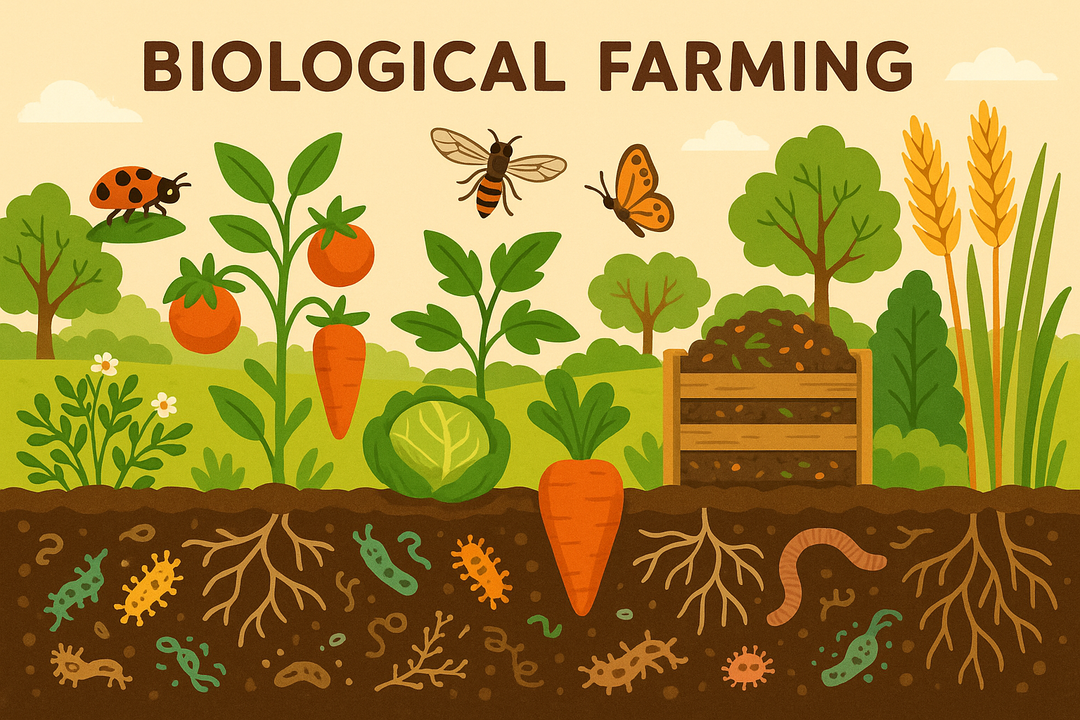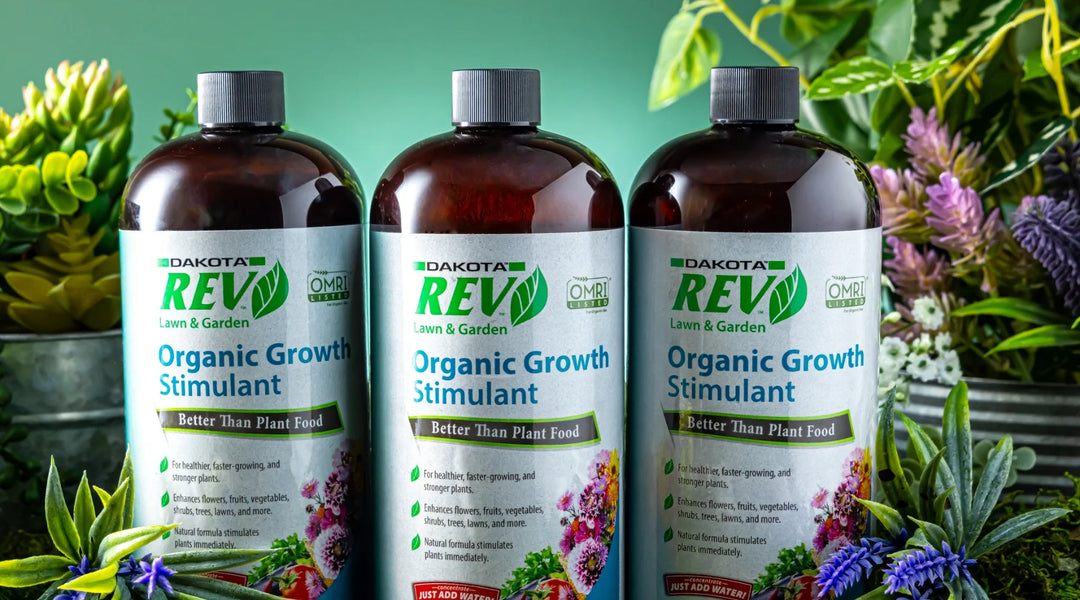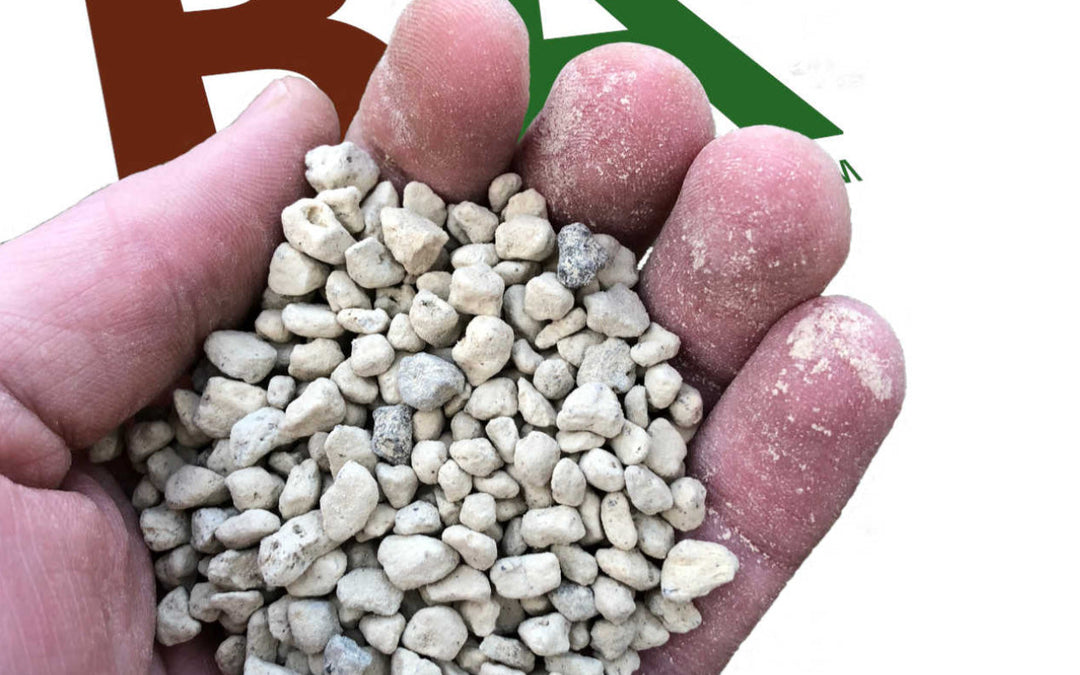Why Organic Lawn Fertilizer?
How much do you really know about fertilizer? Whether you're a casual gardener or a farmer who oversees thousands of acres of crops, understanding why you should choose organic fertilizer is a matter of money, productivity, and environmental impact. Let's explore the ins and outs of choosing organic lawn fertilizers, how they help your plants and the soil, and the problematic effects of synthetic fertilizers.
What Is Organic Lawn Fertilizer?
Organic lawn fertilizer is a type of fertilizer product made from natural sources that gradually releases nutrients into the soil. These fertilizers include ingredients derived from manure, ground bone, powdered fish, minerals from mined rocks, guano, wood, and crushed shells, and are great for adding nutrients, improving soil health, and creating a feeding schedule that is easier to maintain.
What Are the Types of Organic Fertilizers?
Organic fertilizer comes in 2 main styles:
- Liquid organic fertilizer
- Solid organic fertilizer
Although the liquid is relatively self-explanatory, soil fertilizer can come as granules, soil, pellets, or powders. The existence of different styles of fertilizers allows more versatile use as well as added control over the way that it is applied.
The Benefits of Organic Fertilizers
Adding a solid or liquid organic fertilizer can have several benefits, both directly on your plants and on the soil as a whole.
Using an organic fertilizer can help:
- Improve soil structure
- Increase fertility of the soil
- Decrease the number and frequency of fertilizer applications
- Reduce negative environmental impact compared to synthetic fertilizers
Liquid Organic Fertilizer and Soil Structure
Adding organic matter, either as a solid or through liquid organic fertilizer, can have multiple benefits for the structure of your soil. Organic lawn fertilizer increases the cation exchange capacity and improves water retention, which can help create healthier soil. Soil that doesn't retain water or nutrients cannot transfer those materials to the growing plants, which can cause nutrient deficiencies and other problems for the crops.
Soil Fertility with Solid and Liquid Organic Fertilizers
In addition to capacity, liquid organic fertilizer also helps stimulate microbes within the soil and ensures nutrients are released gradually rather than all at one time. Unlike synthetic fertilizers that flood the soil with high levels of nutrients all at once, organic fertilizer encourages a gradual release, which helps ensure sustained nutrient levels for more extended periods. It also helps to choose hearty and durable grass blends like our drought-resistant turf grass blend with microclover.
Many synthetic fertilizers must be reapplied frequently because once the nutrients are absorbed, leached into groundwater or volatilized into the atmosphere there is no sustained benefit to the plants. In addition to requiring more work, synthetic fertilizers don’t typically help cultivate the overall health of the soil, which means that you will need them more frequently throughout the life of the plant.
Is Organic Lawn Fertilizer Better for the Environment?
When we think about environmental impact, it's easy to think of things like recycling or making the change to eco-friendly alternatives like ice melts and organic soil amendments.
However, whether organic lawn fertilizer is better for the environment involves other areas of impact, including:
- Sustainability
- Pollution
- Carbon levels
According to research done by Columbia University, organic farming is considered to be vastly more sustainable for food production than conventional methods. Conventional farming has been shown to cause increased water pollution, biodiversity loss, and soil erosion. Using synthetic fertilizers causes pesticide run-off and water pollution, damaging the environment and negatively impacting plants and animals in the surrounding area.
There is a balance between going entirely organic and reducing your overall carbon emissions. Although using organic lawn fertilizer on your grass and liquid organic fertilizer in the garden is better for the environment, some data shows that there can be a decrease in overall crop yield compared to synthetic fertilizer and conventional farming methods. By utilizing both methods in unison, however, countries can reduce their overall carbon emissions while still producing the required amount of food to meet the needs of their people.
To further support your environmental sustainability, try choosing all-natural organic weed killers and other nature- and pet-friendly products over chemical and synthetic styles.
Sustainability of Liquid Organic Fertilizer
In addition to the increased sustainability of the entire agricultural process, there is something to be said about how the production and sale of organic fertilizers offer a more sustainable alternative to synthetic styles. Brands concerned about their products' environmental impact are typically more likely to ensure that they are using sustainable manufacturing practices, including energy use, transportation, and packaging. Although organic practices always play a role in agricultural sustainability, the reverse isn't always true.
Sustainable manufacturing can help companies in a few key ways:
- Lower compliance costs
- Lower production and resource costs
- Increased access to financing
- Improved brand visibility and sales
- Higher employee satisfaction for hiring and retention
There are a few easy ways for companies to be more sustainable during the manufacturing of organic lawn fertilizer:
- Solar energy
- Responsible water usage
- Biodegradable packaging
- Ethical treatment of employees
Solar Energy and Organic Manufacturing

Solar energy is an excellent way for companies to help power their manufacturing facilities in a way that is more environmentally friendly and sustainable. Although solar energy isn't 100 percent clean or emissions-free, it is considered the cleanest and most naturally abundant renewable energy source.
Water Usage in Sustainable Manufacturing
Although we talk about water frequently, the amount of water used in manufacturing may be surprising to some people. According to the United States Environmental Protection Agency (EPA), industrial and manufacturing industries utilize roughly 12 percent of the public water supply in the United States. Therefore, companies that can recycle the water they use in manufacturing or agriculture can have a significant impact on the overall sustainability of their operation, as well as their industry.
Biodegradable Packaging

Another way that companies can focus on environmental impact and sustainability is by using biodegradable or recycled packaging. For products like liquid organic fertilizer and organic lawn fertilizer, using plastic packaging that can be easily recycled or that is made from post-consumer recycled products is a great first step.
If you're shopping with a company that touts its sustainability and environmental impact, check out how it packages its products. If you think there could be improvements, speak up. One of the best ways to cause change is by encouraging new behaviors, and consumers are in some of the best positions to make positive changes in the companies they shop with.
Ethical Treatment of People and Sustainability
The final way a company can be sustainable in manufacturing is by how it treats its people. Employing ethical hiring practices and treating employees with respect is a major selling point for consumers, and it's becoming increasingly more talked about with respect to sustainability and growth.
Should I Use Organic Lawn Fertilizer?
What about using organic methods on a smaller scale? For the average Joe, using organic lawn fertilizer is a no-brainer. Organic lawn fertilizer helps build the health of your soil naturally rather than relying on synthetic chemicals to supply a constant stream of nutrients.
If you use synthetic supplements on your lawn, you're not allowing your soil to develop. Synthetic fertilizer is also typically quick-release, meaning you must apply it more frequently and consistently if you want your lawn to remain healthy.
Is Organic Fertilizer More Expensive?
Constantly worrying about fertilizing your lawn is not only time-consuming, but it can also be more expensive – even if the price of individual organic lawn fertilizer bags is higher than the synthetic alternatives.
The first step to understanding the price difference between synthetic fertilizer, organic lawn fertilizer, and liquid organic fertilizer is to consider the long-term benefits versus the immediate price. Although organic lawn fertilizer and liquid organic fertilizer tend to be more expensive than their synthetic counterparts, they are also better at providing sustained support.
Synthetic fertilizers are typically quick-release and don't provide as many long-term benefits as organic lawn fertilizer or liquid organic fertilizer. These qualities mean that farmers and gardeners will typically have to use these products longer and more frequently, which can cause the cost to add up substantially. Although the cost of using organic lawn fertilizer or liquid organic fertilizer may be higher per bottle or bag, building up the health of the soil means that you won't have to use it for as long.
If you want to have a better idea of the health of your lawn and garden, our selection of garden tools and equipment can help you keep soil testing at the forefront of your mind.
Where Is Organic Fertilizer Required?

The United States Department of Agriculture (USDA) has strict standards that must be met before a product is labeled as organic. For example, solid or liquid organic fertilizer must be approved by the USDA in order to be used when growing crops.
In addition, for organic labeling, the USDA requires:
- The soil hasn't had any prohibited substance applied within the last three years before an organic crop is harvested
- Only crop rotations, tillage, cover crops, and cultivation practices can be used to manage fertility and nutrient levels
- The primary method for controlling weeds, pests, and diseases will be physical, biological, and mechanical
- Organic seeds are always preferable when available
- The addition of ionizing radiation, genetic engineering, and sewage sludge is prohibited
For organic farming, using a solid or liquid organic fertilizer is required. In extreme situations, synthetic substances that have been approved by the USDA and placed on the National List are allowed, but organic is always preferable.
Do Plants Grow Faster with Organic Fertilizer?

Wouldn't it be great if you could convince your crops to grow faster? Whether it's accommodating a storm or making the most of the time you have for farming, controlling the growth speed of your plants would be fantastic. But unfortunately, research doesn't support the idea that using one type of fertilizer leads to faster plant growth.
Can You Overfeed Plants with Liquid Organic Fertilizer?
One of the most significant advantages of using solid or liquid organic fertilizer versus synthetic types is that it is much harder to overfeed your plants – but not impossible. The faster the uptake of your fertilizer, the more likely you are to overfeed or over fertilize accidentally.
Applying too much solid or liquid organic fertilizer can cause the leaves of a plant or blades of grass to burn. Fertilizer burn is caused by a sudden increase in salt and nitrogen levels and can cause strips or patches of yellow and brown or dead grass. Overfertilizing your plants can also be a waste of money because excess fertilizer can be washed away by rainfall or watering. One example of mismanaged fertilizer? Tomato rot!
Excess growth is another symptom plants may experience when they are overfertilized. Although this seems like a great problem to have, plants that grow faster than their roots can end up dying because the roots aren't able to provide the amount of nutrients and water the plants need to sustain their growth.
In addition, using too much organic lawn fertilizer can cause stress in plants and grass. Although stress itself won't necessarily kill the plants, it can cause a weakening of the plant's immune system, leaving it more likely to be damaged by pests and diseases.
Although it is possible to overfeed your plants or grass using organic lawn fertilizer, it's much less likely because of the delayed nutrient release. Unlike synthetic fertilizers that provide an instant nutrient boost to plants and soil, organic fertilizers break down more slowly. This time frame provides an extended benefit to the soil and plants while also making it hard to overdo it.
Soil Testing with Organic Lawn Fertilizer
The type of fertilizer you use doesn't change the fact that testing the nutrient levels of your soil regularly is still the smartest way to ensure that you are on the correct fertilizer schedule and with the best products and concentrations. Understanding the needs of the plants you want to grow, the proper fertilizer schedule, and how the surrounding environment contributes to the overall success of your garden or grass will help you make informed decisions to ensure success.
Organic Seeds for Organic Fertilizer
One of the best ways to double your positive impact on the environment is to pair your use of organic lawn fertilizer or solid or liquid organic fertilizer with organic seeds. If you're an agricultural operation focusing on organic farming, compliance with the USDA requirements for organic seeds is already top of mind. However, for people interested in growing a garden or adding seeds to their lawn, it may not be the first thing you think of.
Finding ways to make the most of your impact on the environment is key to ensuring that we all are afforded a healthy, beautiful, and sustainable planet now and in the future. Using liquid organic fertilizers for your lawn and garden, organic seeds, and remaining knowledgeable about the health of your soil will make your yard and garden so much easier to maintain.
Whether you're shopping for your backyard or you're a foreman in charge of an entire agricultural operation, Rocky Mountain BioAg® has the products, expertise, and dedication to sustainability you need to help your landscape thrive. From educational posts on our blog to our top-of-the-line products, you'll always find what you're looking for at Rocky Mountain BioAg®.











Leave a comment